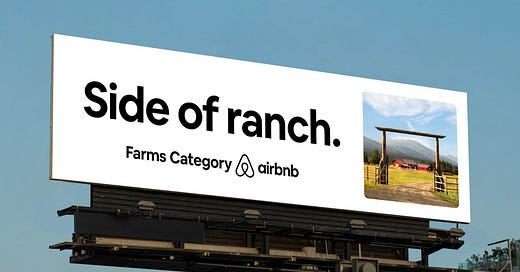Airbnb Is a Hotel Chain
The platform's reinvestment in brand marketing is a masterclass in lobbying.
As always, thank you for being here. If you like what you read, please subscribe and share, and if you have thoughts of your own, don’t hesitate to reach out.
This month, New York City officials began enforcing Local Law 18, which dictates that only people who live in the unit they’re renting out qualify to list those rentals on Airbnb. And by live in, I mean live in — a short-term rental is illegal unless “the permanent resident of the dwelling unit is present during the rental.” So far, at least 10,800 rental properties have been declared illegal.
Opponents argue that Airbnb rentals are unique experiences in their own right, accommodations that reflect local culture in a way hotels do not. This is the magic and lie of Airbnb’s brand marketing efforts, which it has reprioritized after a period of focus on performance marketing. (Think switching to billboards from Google search ads.) As recapped by the Drum:
Last year, Airbnb launched a campaign showcasing its range of over 60 Categories to explore on the platform – from treehouses and off-the-grid cabins to private islands and luxe mansions. It told the stories of travelers staying in some of the platform’s most unexpected and exciting homes, like a giant potato in Idaho and a cave home in Utah.
But let’s be honest: a very small portion of rentals are treehouses, private islands, or luxe mansions, and when they are, they’re financially inaccessible to the majority of Airbnb users. Instead, most Airbnb rentals are not only predictably designed but cheaply executed. Why? Because they’re not actual homes. They are investment properties.
The numbers are clear. The typical Airbnb host owns more than one unit, and when Airbnb claims, as it did in 2020, that 90 percent of Airbnb hosts are individual hosts, they’re defining “individual hosts” as hosts that own less than 21 units. To rephrase their statement, 90 percent of hosts own as many as 20 units. (More on this later.)
The Proliferation of Placelessness
For owners of multiple properties, cost efficiency is key, and mass appeal — homogenized design — is most efficient. Kyle Chayka at the Verge was calling this out over 9 years ago, and his points are just as prescient today as they were then. He argued, rightfully, that Airbnb has accelerated the rise of placelessness — the ability to travel without actually leaving behind your comforts.
We could call this strange geography created by technology “AirSpace.” It’s the realm of coffee shops, bars, startup offices, and co-live / work spaces that share the same hallmarks everywhere you go: a profusion of symbols of comfort and quality, at least to a certain connoisseurial mindset. Minimalist furniture. Craft beer and avocado toast. Reclaimed wood. Industrial lighting. Cortados. Fast internet. The homogeneity of these spaces means that traveling between them is frictionless.
The strange thing about the impact of social media in the nine years since Chayka wrote his piece is that genuine local experiences — the maccelleria on the backstreets of Rome, tea time in London, and so on — are now Instagram fodder, and in becoming so, their popularity explodes to the point they’re inaccessible. A single post from Barstool Sport’s David Portnoy can change the trajectory of a pizzeria. Even a single TikTok post, like Emma D’Arcy’s sbagliato, can turn a specific drink into the go-to order globally, forcing sameness on bartenders.
Ultimately, the internet in general has accelerated the rise and fall of trends, and it can feel like the avoidance of placeless places can mean swapping them out for long lines of tourists who traveled to a destination from the same city you left behind. Airbnb is catapulting and then capturing revenue from this fact via the launch of Airbnb Experiences, which enables you to book your entire trip from the platform itself.
In a strange or perhaps smart way, Airbnb has learned to leverage the human desire for sameness by running parallel campaigns celebrating it: “We imagine a world where you can belong anywhere,” “Strangers aren’t that strange,” and “Why sacrifice comfort for adventure?” Smart play — no one wants to travel uncomfortably. But newness is not discomfort; in fact, it’s the entire purpose of traveling from one culture to another. Exposure to new cultures and ways of living breeds tolerance through understanding.
A Masterclass in Emotional Lobbying
Predictably, Airbnb is now leveraging these same tactics to counter the enforcement of Local Law 18, just as it has in other cities in the past. Throughout New York, it has deployed campaigns that pit city officials against individual hosts David-versus-Goliath style. Taglines like “Don’t punish responsible hosts” and direct quotes from hosts like “Hosting has been an economic lifeline for us” now blanket digital space on city streets.
Of course, there’s no doubt Airbnb is an economic lifeline for some, and Airbnb has been reporting on investments from hotel lobbying groups as far back as 2016. The Times even reported that the American Hotel and Lodging Association had set aside $5.6 million to support these efforts. As it goes, Airbnb has used its own lobbying funds to run campaigns combatting hotel lobbyists: “Dear Public Library System,” one reads, “We hope you use some of the $12 million in hotel taxes to keep the library open later.”
But consider that positioning against the previously shared reality. The vast majority of Airbnb hosts own multiple properties, and that number is growing. Between 2016 and 2022, the percentage of hosts owning a single unit declined from 50 percent to 38 percent.
In short, the economic lifeline story is an increasingly rare one, but its definition of “individual hosts” enables it to stretch the narrative in a way that, in the long run, arguably hurts renters who actually own a single unit. It allows real estate investors to proliferate the platform, leading to localized backlash, resulting in Local Law 18.
An Irreversibile Reality
All of this said, odd as it may sound, I’m not anti-Airbnb, and I actually use the platform. Even if I never expect a rental to be uniquely localized, it’s a trade I’m often willing to make to have a large group stay in one place in a considerably more cost-efficient way than a block of hotel rooms. (I can’t speak to how valuable that is in New York City, since I live here, but that also means I know how disruptive a rental unit can be in a city of such deeply clustered living spaces.)
Furthermore, Airbnb did not create the internet, nor is it a social network. Rentals alone are not guilty of placelessness; everywhere you go, from coffee shops to restaurants to retailers, you’re likely to feel it. We all play a part, and in some ways, it feels unavoidable, as the personal discovery of a genuinely local experience is momentary, given we’re all likely to then broadcast it.
My point is only this: its brand marketing efforts disguise the fact that the platform is increasingly a tool for what are essentially hotel groups, and often poorly managed ones at that. Smart campaign work? Absolutely. Honest campaign work? I’m not entirely sure.
You made it to the end, so you must have enjoyed this piece at least a little bit. If you haven’t already, please subscribe, and feel free to reach out to me at brady@donnelly.nyc.







